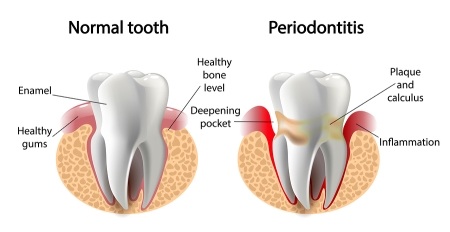WHEN IS PERIODONTAL TREATMENT NECESSARY?
Periodontal disease in Belmont is a serious condition that can lead to tooth loss, massive infections, and painful periodontal treatments. With periodontal treatments—like deep cleanings performed with sedation dentistry—periodontal disease can be contained and treated. Continue reading to find out a few different conditions when periodontal treatment may be necessary.
Localized gum recession has occurred.
Often, advancing gum disease will begin in one area of the mouth. When one area has gum recession, it must be treated as soon as possible to prevent gum disease from spreading to the rest of the mouth. Gum recession can occur because the patient has been brushing too hard or too much in one area. Recession can also be caused by bruxism, also known as teeth grinding, or an improperly-positioned tooth. The recession and resulting gum disease must be addressed right away with periodontal treatment to ensure it does not worsen.
Gum disease has started advancing.
Many patients across the world have gingivitis, the mildest form of gum disease. This condition is easily reversible. However, if gingivitis advances to moderate or advanced periodontitis, then it must be addressed with periodontal treatment. This treatment may consist of a deep cleaning session with a hygienist or periodontist, or it may be managed simply with infection treatment and improved daily dental care. Depending on the advancement of the gum disease, a dentist will recommend the appropriate course of action.
Bone loss has begun.
If gum disease has advanced far enough, then loosening teeth and bone loss can occur. This is very serious and must be addressed as soon as possible to prevent the loss of teeth and bone. A periodontist may suggest a deep cleaning procedure known as scaling and planing. He may also recommend tooth extraction for diseased teeth and aggressive infection-control to prevent further spreading of the disease. To save as many teeth as possible, patients should follow their periodontist’s recommendations as soon as possible.

